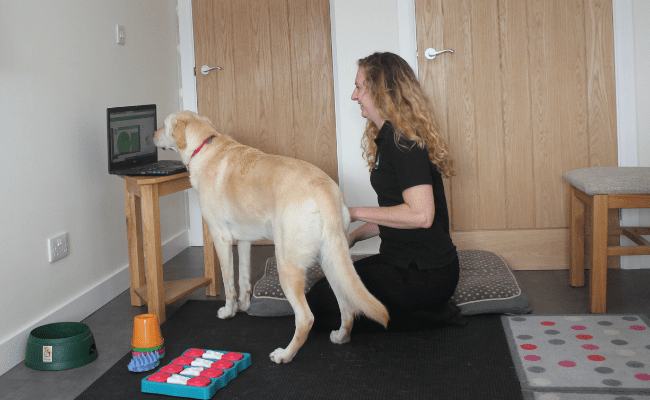How animal assisted intervention is helping people with a dementia diagnosis

Dogs for Good has supported people through its Dementia Dog service for five years and trained both Dementia Assistance Dogs and Dementia Community Dogs. We’ve also worked with individuals and couples providing animal assisted intervention (AAI) to help reduce social isolation and help maintain independence. Over the past year, we’ve had to think differently about how we offer support, but our Dementia Community Dog team rose to the occasion recently with some innovative new projects to provide support and engagement during the pandemic.
How our dogs support younger people with dementia
Dogs for Good’s dementia community dog team is collaborating with a charity called Younger People With Dementia (Berkshire) to run five online dog-themed engagement sessions tailored to YPWD’s attendees.
Young Onset Dementia affects adults of 65 and under and nationally there are over 40,000 younger people with dementia. Traditional services are designed to meet the needs and expected therapeutic outcomes of older adults and subsequently, access to activities appropriate for younger adults with dementia is limited.
Younger People With Dementia (also known as YPWD) was set up in 2012 to assist in filling the gap in provision for those with young onset dementia and their family and carers, providing meaningful respite that works with current provision over the working week.
Dogs for Good and YPWD set up online sessions for eight participants which started on 29th April. It was felt that the client group would like to try a range of games and activities over the weeks and Community Dog Handler, Amy who works with Community Dog, Rita, put together some dog-themed takes on well-known games such as:
- Scavenger Hunt – Rita picks plastic eggs out of a basket. Contained within the eggs are pieces of paper describing an item that participants will have at home. The handler then reads out the item and participants go and ‘hunt’ for the item, bringing it back to camera for a chat about what they have found.
- Cats and Dogs. A twist on the traditional Snakes and Ladders game whereby two teams of participants work their way around a ‘Cats and Dogs’ games board. The amount of places they move is determined by Rita, nose-nudging a giant inflatable dice!
- Dog Bingo. Participants are sent a bingo card ahead of the session that shows photos instead of numbers. Rita ‘chooses’ photos which match to the participant’s cards and the first one to a full house wins.
- Funny facts and stories session about one of Dogs for Good’s Community Dogs.
- Colouring a dog. Participants are sent a piece of paper showing the outline of a dog sectioned up into six different areas. Rita picks a ball (numbered 1-6) out of a basket and participants then colour in the corresponding area on their dog drawing.
Community Dog Rita and her handler, Amy, provided the fun for the first session which took the form of a scavenger hunt. Verbal feedback from participants following the first session was very positive:
“The Dogs for Good session was really good. Informative, and Rita the dog was beautiful, such a lovely face! My husband would love to do more of these workshops if they were arranged.”
“Dogs for good was brilliant, my husband really enjoyed it. You can never have too many dogs!”
“My husband enjoyed the Dog session. He has said that a weekly workshop would be great.”
Colouring by numbers… with Georgie the Dementia Community Dog
Following on from the success of the Dog Days our Dementia Community Dog team ran with Forest of Dean Dementia Action Alliance, we continued to work with them, the Dementia Friendly Community Enabler, mindSCAPE and Crossroads Gloucestershire to deliver a colourful new activity.
Dementia Community Dog handler, Julia works with gorgeous golden retriever Georgie and the session took the form of colouring by numbers… with Georgie as the focus.
Ahead of the session, participants were sent a template with an outline picture of Georgie on it. The picture of Georgie was sectioned up into six different areas and a colour was assigned to each area. “Once people were ready, Georgie picked a numbered ball (from one to six) out of a basket and participants coloured in the corresponding area on the template,” explains Julia. “Some people decided to use a block colour approach and others drew patterns. It was loads of fun and people really enjoyed it!”
The final versions of the colourful Georgies are to be included in an online art exhibition, hosted by Artspace, which has an online private viewing scheduled for the end of May.
Hayley Stimpson from Dogs for Good says: “The aim of activities like this one is to engage people through their love of dogs and provide support and connection to those who may feel isolated as a result of Covid. We know that some people’s wellbeing has deteriorated through the pandemic, leading them to be fearful of going out. Activities such as these can provide a gentle, positive stepping-stone to getting back to being in a group setting, albeit online.”
For more information about how dogs can support people with a dementia diagnosis visit the Dementia Dog website.